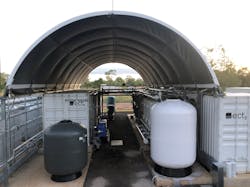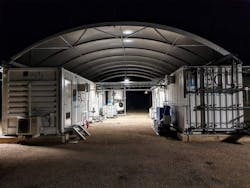RAAF Base Tindal, NT Australia
In 2018 Defence completed a detailed environmental site investigation incorporating RAAF Base Tindal and private land in the vicinity of the Base. The investigation identified that PFAS contamination had entered groundwater and migrated off-site towards the Katherine River. As a result of the contamination, restrictions in the use of ground and surface water were placed on impacted properties surrounding the Base. The Katherine town water supply was also impacted by the contamination. Two primary source areas were identified on the Base; the fire training area (FTA); and the fire station area (FSA).
ECT2 was contracted to install groundwater treatment systems at both the FTA and FSA source areas to assist Defence in managing PFAS contamination on the Base and impacted surrounding properties. The remote location, climatic conditions and lack of waste disposal and treatment facilities for PFAS laden waste in the NT represented important considerations during the design of a solution that would not only ensure that the selected water treatment technology would reduce PFAS levels to health-based guidance values (HBGV) established for drinking water, but to do so in a way that would minimize waste generation.
Modular 12.6L/sec treatment systems were installed at the two source areas. Groundwater is extracted via wells, passes through pre-treatment media to remove fine solids, volatile organic compounds (VOCs), semi-volatile organics (SCVOCs) and total organic carbon. The pre-treated water then passes through ECT2’s proprietary SORBIXTM RePURE regenerable resin to remove PFAS compounds and finally through specialty SORBIX PURE resin which acts as a final polish, targeting shorter chain PFAS compounds. Treated water is then directly reinjected into the aquifer via separate well networks at each location. A central SORBIX RePURE regeneration systems services both the FTA and FSA systems.
The FTA and FSA treatment systems were commissioned in December 2018 and March 2019, respectively. The regeneration system has been operational since April 2019. The lead/lag configuration, multiple electronic fail safe features and remote monitoring capabilities have helped the water treatment systems achieve an uptime of over 98% during 24/7 operation. By mid-March 2020, the treatment systems had treated over 655 million litres of groundwater, and the regeneration system had completed four regeneration of SORBIX RePure resin, which would have otherwise had to be sent off-site for further treatment and disposal. There have been no exceedances of the established treated water criteria.
Editor's Note: Scranton Gillette Communications and the SGC Water Group are not liable for the accuracy, efficacy and validity of the claims made in this piece. The views expressed in this content do not reflect the position of the editorial teams of Water & Wastes Digest, Water Quality Products and Storm Water Solutions.

